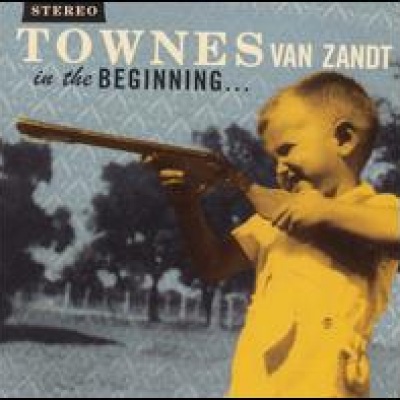
In the Beginning...
by Thom Jurek In the Beginning is, unlike so many posthumous recordings or rip-off collections of sub-par material by major artists, the real thing. These ten songs feature Van Zandt, already developed as a considerable songwriting talent, in his debut Nashville session produced by none other than Cowboy Jack Clement. Some can debate the quality of these songs against his others, but to this critic it doesn't make a whit of difference. In 1966, two years before the issue of For the Sake of the Song, Van Zandt was already deeply entrenched in his rambling tales of losers, gamblers, ne'er-do-wells, and restless drifters who somehow made up his ethos. His poetry, like Bob Dylan's or any great bluesman's, could stand apart from the music. While the material recorded with a band is steeped sonically in the rock sound of the time, it is nonetheless timeless. Anybody whose first couplet on track one is, "I got a black widow for a mama, Lord/I got a Diamond back rattler for a Pa," backed by a driving, lonesome guitar a two-note bassline and garagey 4/4 drumbeat, is already in the pocket of his art. "Black Widow Blues" and "Hunger Child Blues" are out-and-out rockers, with Van Zandt's voice like an Old-Testament prophet abandoned by God roiling above the din. But there's the sparse beauty of his solo material, too. "Gypsy Friday," with its restless, wandering spirit, is summed up in one line: "If you want to call me friend/The friend you best begin/Blowing secrets to the winds of gypsy Friday." "Waitin' for the Day" is deeply influenced by Hank Williams' forlorn waltzes, with Van Zandt's turnarounds built into the country lines. "Black Jack Mama" is a blues in the same way Dylan's "Subterranean Blues" is, except for one thing -- Van Zandt gets the same effect with just a guitar. But Van Zandt's greatest gift was his empathy, rooted firmly in a lonesome tenderness that could take brokenness into his songs, even at this early date, and turn them into stories that were not only descriptive and honest emotionally, but psychologically instructive. In "Maryetta's Song," with his slow, flatpicked run carrying the outlines of his melody, he sings: "She stands all alone with her sorrow/Like a bird that's afraid to sing/She lives for the pain tomorrow will bring/Will she call if she starts to go/Or will she silent go?" That same question could have been asked of Van Zandt, and sadly, we know the answer. The plaintive "When Your Dream Lovers Die" is one of the most stunning love songs in his catalog. "In the Beginning" offers time-tested proof that Van Zandt existed as an artist, to bring the song the life it deserved apart from time and space -- and perhaps even his own authorship. In the Beginning is a necessity for any fan; the packaging is gorgeous, with paintings of Van Zandt, photographs, and lyrics. The sound is pristine and the music is as necessary as anything in his oeuvre.
